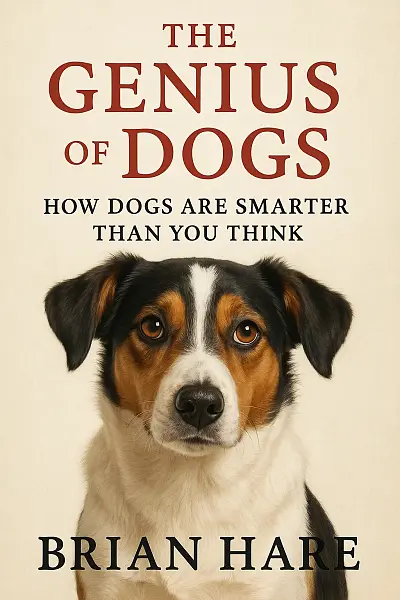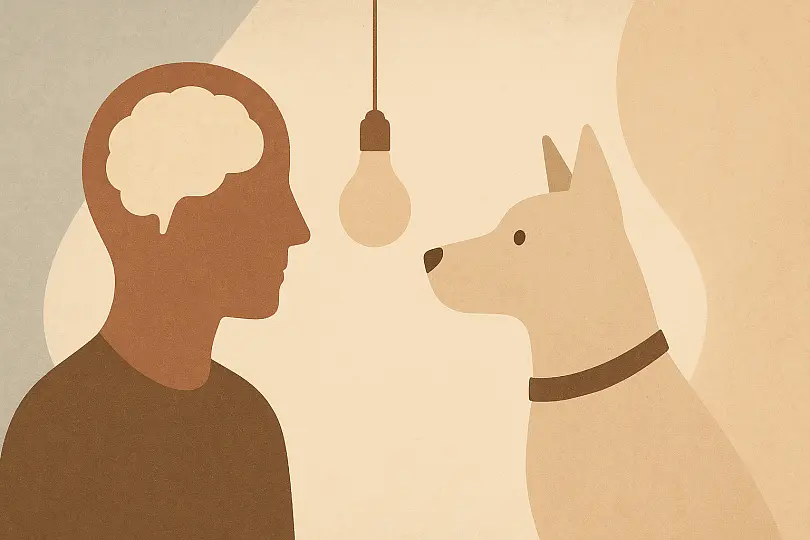
The Genius of Dogs: How Dogs Are Smarter than You Think
by: Brian Hare
Brian Hare, a passionate scientist, dives into the intriguing world of canine intelligence, using years of fascinating research as his playground. He sets out to help dog lovers everywhere understand why their pups seem to read minds, break rules, and charm their way into our hearts—turning daily mischief into a puzzle worth solving.
Everything changes when Hare uncovers that dogs’ smarts aren’t about obedience or breed—they’re about empathy and how they connect with us. Now, readers must rethink what it means to be “smart,” balancing the urge to control with the opportunity for deeper connection.
Curious yet approachable, Hare's narrative invites us to look past training manuals and ask: Can we really outsmart our cleverest companions, or is the real genius learning to see the world through their eyes?
""True intelligence is not always measured by what we invent, but by how deeply we connect and understand each other—even across species.""
Let's Break This Down
The Author's Voice
Atmosphere
Get ready for a warm, inquisitive, and delightfully curious vibe—this book feels like sitting with a favorite science-loving friend at a café, swapping surprising stories about dogs. There’s an infectious sense of wonder throughout, with science made genuinely fun and discoveries delivered with a dose of playful affection for our canine companions.
Prose Style
Brian Hare’s writing is accessible and inviting, never bogged down in jargon but never dumbing things down either. The prose skips along with clever analogies, conversational banter, and a peppering of personal anecdotes. Explanations are clear and vivid, often punctuated by witty asides that make even complicated neuroscience feel like casual conversation.
Pacing
Expect a pace that’s brisk but never rushed—the chapters move forward with purpose, each experiment or story building naturally into the next question. There’s little meandering, just the occasional pause to marvel at a particularly clever dog before plunging into another engaging study. As a reader, you’re always tempted to read just one more chapter.
Structure
The book is tightly organized around big questions and eye-opening experiments, alternating between fascinating case studies, wide-angle evolutionary theories, and memorable moments with real dogs. Sections are bite-sized, easy to dip in and out of, yet together create a strong, cumulative argument.
Tone
There’s a friendly, encouraging tone to everything—never patronizing. Hare comes off as genuinely passionate about teaching and sharing, eager to let readers in on the secret brilliance of dogs, yet humble enough to admit where the science is still evolving.
Overall Feel
Jump into these pages expecting a lively, insightful ride through discovery, laughter, and “aha!” moments—this is science writing with a wagging tail, perfect for dog lovers and curious minds alike.
Key Moments
-
Dogs outsmarting scientists in "Pointing Game" experiments — pure canine genius in action
-
Jaw-dropping moment: wolves vs. dogs showdown reveals brains, not just brawn, make dogs unique
-
Fascinating case studies of rescue pups reading human emotions better than some people
-
Light, witty storytelling—Brian Hare writes like your cleverest friend, making science feel like play
-
Unexpected detours: African village stray dogs cracking complex problems faster than pedigreed pets
-
Big takeaway: evolution designed dogs not for obedience, but for collaboration—they're partners, not minions
-
Cuddly yet cerebral—you’ll never look at your dog’s tilt-headed confusion the same way again
Plot Summary
The Genius of Dogs: How Dogs Are Smarter than You Think by Brian Hare isn’t a traditional narrative but rather a fascinating journey through scientific discoveries and personal anecdotes, exploring how dogs’ intelligence has evolved alongside humans. The book begins with Hare sharing his own childhood dog experiments, leading to his groundbreaking research into dog cognition at Duke University. Major “twists” come as Hare debunks old myths about canine intelligence, revealing through a blend of experiments and stories that dogs excel at reading human gestures, emotions, and social cues—sometimes even better than our closest primate relatives. The book’s climax is Hare’s argument that dogs’ “genius” isn’t about being smarter in a human sense, but about their extraordinary ability to understand and cooperate with people. The resolution wraps up with Hare inviting readers to see dogs not as subpar wolves, but as animals shaped by evolution to connect, communicate, and co-exist with humans in remarkable ways.
Character Analysis
Although The Genius of Dogs is nonfiction and doesn’t center on traditional characters, Brian Hare himself is a lively, engaging presence throughout the book—his curiosity, humility, and genuine affection for dogs drive the narrative forward. Hare’s arc moves from a kid with simple curiosity to a leading scientist challenging dogma (no pun intended) about animal minds. Dogs themselves are the real “characters,” ranging from Hare’s childhood pets to service, stray, and shelter dogs, each illustrating a facet of canine genius. The book explores their motivations—driven by evolution, survival, and adaptation to human society—and shows how their relationships with humans have fundamentally changed both species.
Major Themes
At its heart, the book digs into the theme of cognition and evolution, highlighting how dogs’ abilities sprang not from raw IQ, but from domestication—a co-evolutionary partnership with humans. Another major theme is misconceptions about intelligence; Hare repeatedly challenges the notion that animal intelligence is a linear, one-size-fits-all hierarchy, urging us to recognize genius in different forms. The book also explores connection and communication, showing through experiments (like dogs following human pointing while even chimps fail) how deep our interspecies relationships go. Throughout, there’s a subtle message about empathy and respect for animals, inviting us to rethink what it means to be “smart.”
Literary Techniques & Style
Brian Hare brings a breezy, conversational writing style to what could easily be dry scientific material, blending anecdotes with clear explanations of complicated studies. He uses vivid metaphors—likening dog cognition to “social eavesdropping”—and playful examples to make data pop. The narrative structure is loosely chronological, tracing Hare’s research career, but digresses to explore different breeds and real-world implications, keeping the tone lively and accessible. There’s a strong use of rhetorical questions and direct address that pulls readers in, plus well-placed statistics and firsthand stories that make the science relatable.
Historical/Cultural Context
Set in the 21st century, the book taps into a cultural moment when pets are increasingly regarded as family members and animal cognition is hitting mainstream science and media coverage. Hare’s work follows a tradition of animal intelligence research but breaks ground by validating the “friend dog” theory over the “obedient wolf” model prevalent in the 20th century. The book emerges in a context of shifting attitudes toward animals’ rights and cognitive abilities, intertwining with debates on evolution, genetics, and how humans shape other species.
Critical Significance & Impact
The Genius of Dogs made quite a splash in both scientific circles and popular media for challenging old stereotypes about what it means to be intelligent. While some critics found it a bit anecdotal in places, the book is widely praised for combining rigorous science with warmth and humor, making complex ideas accessible to general readers and students alike. Its lasting impact is in helping to reshape our cultural and scientific view of dogs, and sparking further research and debate on animal cognition, evolution, and our responsibilities as their evolutionary partners.

Unlocking canine minds: How science reveals the surprising genius of dogs
What Readers Are Saying
Right for You If
If you’re the kind of person who lights up every time you see a dog—honestly, you’ll probably eat this book up. The Genius of Dogs is perfect for folks who are obsessed with their pups, love quirky animal facts, or have a thing for books that blur the line between pop science and feel-good reads. Think Mary Roach or Malcolm Gladwell with a heavy dose of wagging tails.
- Dog lovers (obviously)—whether you live with a whole pack or just appreciate a good dog meme, there’s a ton here to geek out about.
- If you’re curious about animal intelligence or like books that make you see familiar things in a new way, this will absolutely hit the spot.
- Fans of science writing that’s actually fun—the style is lively, with lots of stories and experiments, so it never feels like homework.
- If you dig discussions about the human-animal bond and want to know why your dog is so weirdly in tune with you, this is basically a must-read.
But honestly? If you’re just not that into science—a.k.a. you’d rather read a novel than dive into research studies, or you want straightforward dog-training tips—this might not be your thing. Hardcore science buffs might also find it a bit light; it’s more playful than deeply technical.
Bottom line: If you’ve ever looked at your dog and thought, “What’s going on in that fuzzy little head?”—grab this book. But if you’re looking for a super dense, academic dive or you’re not really an animal person, you can probably skip it.
What You're Getting Into
Ever wondered what’s really going on behind those puppy-dog eyes? The Genius of Dogs by Brian Hare dives into the incredible world of canine intelligence, revealing the surprises behind how dogs think, solve problems, and connect with humans. Through eye-opening research and handfuls of delightful stories, the book uncovers just how much smarter (and unique) our furry friends are—get ready for a fun, mind-expanding ride into what makes dogs tick!
Characters You'll Meet
-
Brian Hare: The curious and passionate scientist-author who explores canine intelligence through research and personal anecdotes. His investigations and discoveries anchor the book’s explorations of what makes dogs unique.
-
Vanessa Woods: Co-author and Hare’s research partner, she offers thoughtful insights and often challenges Brian’s ideas, contributing a collaborative and critical perspective to their experiments and findings.
-
Dogs (as a collective “character”): The real stars of the book, dogs serve as both subjects and inspirations, showing diverse cognitive abilities and social intelligence that constantly surprise the researchers.
-
Dognition Participants: Owners and their dogs who engage in at-home experiments, illustrating the book’s inclusive, crowd-sourced approach to science while highlighting the human-dog bond across different backgrounds.
More Like This
If the curious brilliance of Are We Smart Enough to Know How Smart Animals Are? by Frans de Waal captivated you, The Genius of Dogs is bound to feel like its canine cousin—a book that sweeps you into the fascinating world of animal intelligence but zooms in lovingly on man’s best friend. Both authors unravel the mysteries of animal minds with clarity and warmth, yet Brian Hare’s engaging storytelling makes you want to grab your leash and hit the dog park, eager to observe every tilt of your pup’s head.
Similarly, fans of John Bradshaw’s Dog Sense will appreciate how Hare dives deep into the science of canine cognition while keeping the insights accessible and joyfully relatable. Where Bradshaw explores our relationship with dogs from a behavioral perspective, Hare leans into the astonishing capabilities and evolutionary quirks that set dogs apart—often celebrating their surprising cleverness in ways that transform how you see your pet.
On screen, the book echoes the spirit of Pick of the Litter, the heartwarming documentary following puppies as they train to become guide dogs. Both deliver a delightful mix of awe and affection, showcasing not just how dogs learn, but the intricate ways humans and dogs shape one another’s destinies. If you enjoyed watching those smart pups rise to the occasion, get ready to be charmed by the science that uncovers just how those canine brains tick.
Critic's Corner
What if the secret to your dog’s intelligence isn’t about obedience or raw brainpower, but about an unshakeable social genius—one that’s evolved right alongside us? That’s the irresistible premise behind Brian Hare’s The Genius of Dogs: How Dogs Are Smarter than You Think, a book that upends our assumptions about “man’s best friend” and what intelligence really means in the canine world. Are we underestimating the creatures curled up at our feet—or have we misunderstood what “smart” truly is?
Brian Hare, drawing on decades of animal cognition research, writes with clarity, wit, and infectious enthusiasm. He infuses his explanations with warmth, using relatable anecdotes from real-life dog owners alongside vivid experimental snapshots. The narrative is refreshingly free of jargon; Hare simplifies complex scientific methodologies without dumbing them down, making the book accessible whether you’re fresh to the topic or a seasoned pet lover. His prose has a conversational, lightly ironic touch, breezing along at a pace that keeps the lay reader invested but doesn’t alienate those wanting a deeper dive. Hare’s coauthor, Vanessa Woods, further sharpens the storytelling, ensuring the science remains lively and personal. If there’s a flaw in the craft, it’s occasional repetition—some points could be made more succinctly, and digressions into Hare’s own research history occasionally distract. Still, the light, engaging style never loses sight of the book’s passionate core.
At the heart of The Genius of Dogs is a radical redefinition of intelligence itself. Hare convincingly argues that dogs aren’t “dumbed-down wolves” but evolutionary prodigies—uniquely adapted to decode, cooperate, and communicate with humans. Through playful thought experiments, cross-species comparisons, and the notorious “pointing test,” Hare demonstrates that social acuity may be the ultimate measure of canine genius. The book is deeply relevant in a culture obsessed with “ranking” animals—and people—by narrow IQ scales. Hare dismantles the idea that dominance or breed alone explains dog behavior, challenging entrenched training myths with both compassion and logic. Philosophically, he prompts us to question our concepts of partnership, empathy, and what it means to be “smart.” If there’s a limitation, it’s that Hare’s optimism can verge on evangelism—sometimes sidestepping messier realities about breed differences or training frustrations. Yet The Genius of Dogs never loses sight of its central, humane message: dogs have shaped us, as surely as we’ve shaped them.
Within the burgeoning field of canine cognition writing—think Alexandra Horowitz’s Inside of a Dog or John Bradshaw’s Dog Sense—Hare’s work stands apart for its blend of rigorous science and disarming charm. Where others focus on perception or behavior, Hare’s emphasis on evolutionary partnership is both timely and refreshing. The book also extends Hare’s academic work into an inviting, accessible package, broadening the conversation around how—and why—we live with dogs.
The Genius of Dogs isn’t flawless: pacing sometimes wavers, and not all readers will be convinced by Hare’s more dramatic conclusions. Yet its strengths—engaging prose, scientific curiosity, and heartfelt advocacy for the dog-human bond—easily outweigh its missteps. For anyone who’s ever wondered what’s going on inside that furry head, this is an eye-opening, conversation-sparking must-read.
Community Thoughts
I was NOT ready for the way this book made me side-eye my own dog. Brian Hare dives deep, and suddenly I'm questioning who’s really training whom in my house. Wildly fun and unexpectedly humbling!
I started this book thinking, “dogs are cute, sure,” and now I’m pausing every walk to stare at my beagle wondering if she’s plotting world domination. Absolutely ruined my routine in the best way.
Wasn't ready for the mental workout this book gave me. Stayed up way too late, thinking about how my dog totally hustles me for treats. Hare's stories make me want to run IQ tests on every pup I see.
I was just reading about dogs figuring out human gestures and suddenly remembered that time my own pup beat me at hide-and-seek. This book perfectly echoed those moments, making me realize my dog might actually be the genius in the house.
I picked up The Genius of Dogs expecting fluffy anecdotes but instead tripped over science bombs. My sleep schedule? obliterated. I couldn’t stop wondering if my dog was secretly outsmarting me at every turn.
Leave Your Review
Local Take
Why It Matters
The Genius of Dogs: How Dogs Are Smarter than You Think really strikes a chord with readers in Japan, where the relationship between humans and animals is colored by centuries of folklore, Shinto beliefs about animal spirits, and a modern culture that celebrates pets as family members.
- Parallels pop up between the book’s emphasis on dogs’ intelligence and Japan’s own history of heroic, loyal dogs, like Hachiko—a symbol of devotion and deep emotional understanding.
- The book’s core themes around empathy, communication, and mutual respect totally resonate with Japanese values of harmony (wa) and coexistence.
- On the flip side, the way the book challenges the “humans above animals” mindset shakes up traditional hierarchies that still pop up in Japanese society, especially among older generations.
- Plot points about canine adaptability and cleverness might hit differently here too, since Japanese literature often personifies animals to reflect on human nature—think about how manzai routines and folktales use animals as witty, insightful characters!
It’s a fun bridge between Western scientific inquiry and Japan’s long tradition of animal reverence and story-weaving—sparking both appreciation and reflection!
Food for Thought
Notable Achievement/Cultural Impact
The Genius of Dogs gained widespread attention for making canine cognition research accessible and popularizing the idea that dogs possess unique, sophisticated intelligence. The book sparked massive interest in dog behavior science, led to international bestseller status, and inspired educational programs like the "Dognition" citizen science project, bringing everyday dog lovers into the realm of animal cognition research.
Like what you see? Share it with other readers







